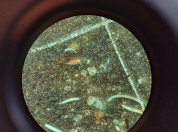Search
Filter by
Type
Tags
Dossiers
Themes
Departments
Active filters
21 search results
Search results
-
How genetic research contributes to effective lion conservation
Human measures to protect lions have an impact on the genetic health of populations. Dutch and Kenyan scientists discovered this by analysing the DNA of 171 Kenyan lions. "By fencing reserves, for example, the chance of inbreeding increases." With the knowledge and tools from the research, management authorities in Kenya can better protect their valuable wildlife in the future.

-
Biodiversity on the NIOO terrain
At NIOO we strive to stimulate the biodiversity on the green roofs and the terrain. On the occasion of NIOO’s 68th birthday, colleagues launched a BioBlitz: a period of biological surveying to record the living species within a designated area.
-
Greenhouse gases
Climate change is amplified by greenhouse gas emissions. At NIOO, we work on the fundamental understanding of how gases such as methane, carbon dioxide and nitrogen dioxide influence ecosystems. Our knowledge of carbon and nitrogen cycles provides insight into the potential of greenhouse mitigation tools. In a Dutch freshwater lake or the soil of a tropical rain forest.
-
Book presentation on Water farming
On Friday afternoon 29 September, a new book about Water farming will be presented at NIOO. NIOO scientists Ellen Weerman and Ellen van Donk are two of the editors, and you are very welcome to join. The presentation will be in Dutch.
-
BiodiversityXL Community Event at NIOO
The next BiodiversityXL Community Event is coming up soon and this time it's going to be at NIOO!
-
Soil biodiversity analysis for sustainable production systems (SoilProS)
SoilProS will interpret big data on soil biodiversity, soil chemical and physical characteristics with respect to current and desired soil functions, and how to use this information in order to help farmers predicting which crop varieties, seed mixtures, (organic) fertilizers, soil inocula, and organic substrates enhance the environmental sustainability of their activities.
-
Discovering methane eating mycobacterium
Join the Pint of Science lecture where Paul Bodelier and Chrats Melkonian tell us all about their recent discovery of Mycobacterium (a type of immobile, rod-shaped bacteria) that live on eating methane. Hear what we can learn from these microbes and how we can use that to tackle the issues facing methane in our atmosphere today. -
New greenhouse gas-eating bacteria found in highly acidic sulphur cave
A team of ecologists and microbiologists that includes NIOO's Paul Bodelier has identified a unique organism in samples from a Romanian cave nicknamed 'Stinky Mountain'. The novel bacteria can grow on methane, an important greenhouse gas that contributes to global warming.
-
Biodiversity XL Live: The Sound of Biodiversity
Yet another fascinating episode is coming up for the BiodiversityXL Live short livestream series: the Sound of Biodiversity! More and more different approaches and techniques are used, in the hope to gain more knowledge about biodiversity. They help us to look very detailed at individuals, species and ecosystems. But let's not forget about our ears. Sound can tell a lot about the presence of species, but also about their behaviour. Sounds we can hear, like bird songs, but also sounds we can not hear. How do we monitor biodiversity via sound?
-
PhD thesis defence Azkia Nurfikari: residual streams from insect cultivation for sustainable crop management
Azkia Nurfikari will defend her PhD thesis "Prospects of residual streams from insect cultivation for sustainable crop management".

